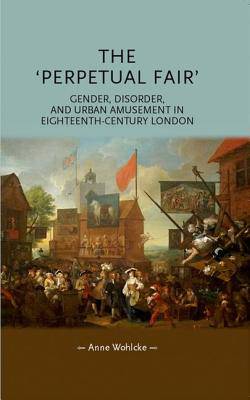
- Retrait gratuit dans votre magasin Club
- 7.000.000 titres dans notre catalogue
- Payer en toute sécurité
- Toujours un magasin près de chez vous
- Retrait gratuit dans votre magasin Club
- 7.000.0000 titres dans notre catalogue
- Payer en toute sécurité
- Toujours un magasin près de chez vous
The 'Perpetual Fair'
Gender, Disorder, and Urban Amusement in Eighteenth-Century London
Anne WohlckeDescription
Each summer, a 'perpetual fair' plagued eighteenth-century London, a city in transition overrun by a burgeoning population. City officials attempted to control disorderly urban amusement according to their own gendered understandings of order and morality. Frequently derided as locations of dangerous femininity disrupting masculine commerce, fairs withstood regulation attempts. Fairs were important in the lives of ordinary Londoners as sites of women's work, sociability, and local and national identity formation. Rarely studied as vital to London's modernisation, urban fairs are a microcosm of London's transforming society, demonstrating how metropolitan changes were popularly contested. This study contributes to our understanding of popular culture and modernisation in Britain during the formative years of its global empire.
Fascinating examples drawn from literary and visual culture make this an engaging study for scholars and students of late Stuart and early Georgian Britain, urban and gender history, World's Fairs and cultural studies.Spécifications
Parties prenantes
- Auteur(s) :
- Editeur:
Contenu
- Nombre de pages :
- 256
- Langue:
- Anglais
- Collection :
Caractéristiques
- EAN:
- 9780719090912
- Date de parution :
- 31-05-14
- Format:
- Livre relié
- Format numérique:
- Genaaid
- Dimensions :
- 145 mm x 216 mm
- Poids :
- 439 g

Les avis
Nous publions uniquement les avis qui respectent les conditions requises. Consultez nos conditions pour les avis.






